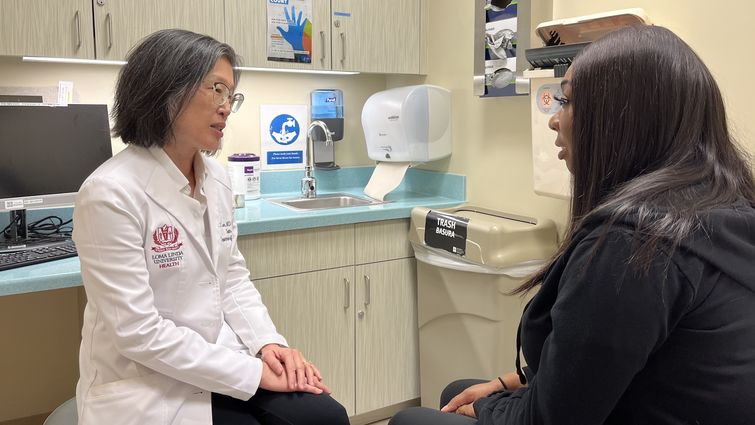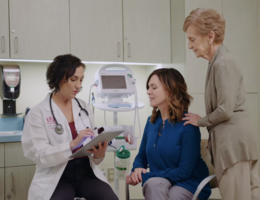

Sharon Lum, MD, MBA, chair of the LLUH Department of Surgery, often speaks to patients about the role genetic testing can play in breast cancer prevention or early detection.
Breast cancer is the most common cancer in women in the United States, except for skin cancers, according to the American Cancer Society, with about 5% to 10% of breast cancer cases estimated to be hereditary — meaning they result directly from gene changes (mutations) passed on from a parent.
Genetic testing for breast cancer can provide crucial information to help individuals and healthcare providers make informed decisions about prevention and early detection strategies, says Sharon Lum, MD, MBA, chair of the Loma Linda University Health Department of Surgery. For October’s Breast Cancer Awareness Month, Lum discusses how genetic testing works, who should consider it, and its advantages for those eligible.
Get our newsletter for cancer-fighting tips, activities and recipes. Subscribe
Because of genetics, patients with a family history of breast cancer may be at a higher risk for developing the disease. Some people inherit mutations in specific genes that increase their risk of breast cancer, though levels of risk vary depending on individual circumstances. Lum says genetic testing looks for any mutations in some of these genes and provides patients and providers with more insights about their breast cancer risk and how to move forward with their care.
Lum advises individuals to speak with their healthcare provider about genetic testing and whether it could benefit them. Testing may be an option for men and women with a strong family history of cancer, as well as some women who have been diagnosed with breast cancer. Because it is unusual for men to get breast cancer, it is recommended that all men who have had breast cancer get tested. While genetic testing can be helpful in some cases, Lum says not everyone needs to undergo testing; healthcare providers consider a range of factors when determining whether genetic testing is appropriate.
For eligible people, Lum strongly recommends undergoing the test, during which the patient provides a blood sample or saliva swab that is sent to a laboratory for analysis. She says the testing can yield life-changing, even life-saving, information.
“If you're able to identify someone who has a cancer gene before they develop cancer, you have an opportunity to prevent that person from getting cancer,” Lum says.
Read: Breast cancer expert shares four ways to lower risk, catch cancer early
Before participating in the testing, Lum says patients will talk with their healthcare providers about various outcomes and potential options depending on the results. Lum says that plans and preferences may change upon receiving test results, but having a sense of a “game plan” before testing helps in preparation.
Though the most common cause of hereditary breast cancer is an inherited mutation in the BRCA1 or BRCA2 gene, Lum says several more genes are known to increase breast cancer risk. She says rapidly developing technology has enabled genetic testing to test for a panel of several mutations simultaneously.
“The level of sophistication and detail genetic testing offers today is much better than in the past,” Lum says.
Read: Genetic testing offers patients speedy diagnoses, individualized cancer therapies
Women with one of the BRCA genes have a roughly 60% chance of developing breast cancer in their lifetime, Lum says. Some patients may hesitate to take the test and deal with daunting results, Lum says, but she ultimately urges all eligible individuals to opt for testing. She says the beneficial protective measures healthcare providers and patients can take based on test results far outweigh the anxiety and risk of developing the life-threatening disease unknowingly. Lum's father is a BRCA 1 carrier, so she has undergone genetic testing and can relate to patients' experiences.
“I fundamentally believe knowledge is power, and always recommend the genetic testing when indicated,” Lum says. “It’s a highly actionable test because there are things you can do that can effectively prevent the cancer or detect it early."
Discovering that a person is a carrier of a breast cancer gene can empower them to maintain a strict screening schedule, Lum says, “so you know that you can find breast cancer early, treat it, and cure it.” Some women with a breast cancer gene opt for a prophylactic mastectomy, which can lower breast cancer risk by more than 90%, Lum says.
Moreover, Lum says many breast cancer mutations are also linked to other cancers, such as ovarian cancer, pancreatic cancer, and skin cancer called melanoma. Results from the genetic testing can therefore alert the patient and healthcare provider to the risk for other cancers.
“Genetic testing for those who are eligible can prove impactful and can change lives,” Lum says.
Get our newsletter for cancer-fighting tips, activities and recipes. Subscribe
At Loma Linda University Cancer Center, physicians are committed to providing patients with compassionate, comprehensive, and personalized care that gives them the best opportunity to face and overcome breast cancer. Learn more about breast cancer care at the Cancer Center online or call 1-800-782-2623.


